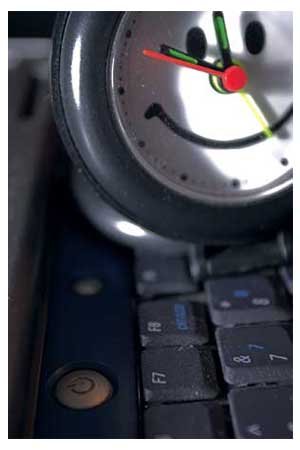

|

iPods and MP3 players also like to make you wait. Old fashioned music players like Sony Walkman cassette players used to start playing when you pressed play. But where is the sense of grandeur and importance in that? If you have to press power, and wait, it gives you a sense that something special is about to take place. Like wow, this song is going to be good because it's too awesome to just start playing. The anticipation makes the song that much better. The silence is like a mini-cover band you have to endure until the main event - it makes you want to hear the band even more. I mean, it must be better, right? Even 8-track tapes and records were instant - and we all know CDs and MP3s are better.
Digital cable is also better than "regular" cable for the same reason. With normal cable, you would waste time quickly flipping channels, watching several shows at once, making your girlfriend angry because you keep flipping. But with digital cable, that problem is finally solved - but how? With pauses of course! Now in the time you could have flipped through five or six channels, digital cable is showing you a black screen. By the time you would have been seven channels on your merry way of channel flipping, digital cable will finally render the second channel. And would you want to press the channel up button again? I don't think so - that first pause was punishment enough, you don't need to go through that again. Your girlfriend will say, "Lets just watch this," and then it is done. There will never be this thing called channel flipping again.
Computers have also come a long way. My old "Mega ST" had an off/on switch. And I don't mean a power button that lets you boot up and shutdown, I mean an actual switch that caused your desktop to appear on the screen right away when you flipped it. There didn't need to be a shut down procedure, because when you were done with your computer, you just reached for the switch and turned it off. That was it. It cut the power and it was off. Instantly. No, it didn't corrupt anything, because it was actually designed to do that. But booting up slowly makes your laptop feel like it's actually doing something really complicated and important. Sure, my old Mega ST also used a mouse, ran a graphical user interface, did word processing, spell checking and all the rest too, but if you have to wait 60 seconds before your desktop appears, then you feel that the money you spent on the PC was well worth it. If it all just pops up on your screen instantly, it must be too easy, right? Who'd pay a thousand dollars for that?
One of my profs once told me a story of a job he had where he had to write a program to analyze data for a client. They were charging this client tens of thousands of dollars to do this. Well, being a pretty smart guy, he finished this program in a couple of days and showed it to his boss. He ran the program and 20 seconds later, the data was analyzed and the results were obtained. His boss freaked and told him that was unacceptable. He couldn't charge all that money for such a small and fast program. The answer, of course, is that he had to go back and put in a six hour delay into the program so that it looked like it was doing something very hard and complex. And then everybody was happy.
In fact, this pausing idea is catching on almost everywhere - remember the olden days when you flipped a light switch, the light turned on? Now with compact florescent lighting, you get the bonus pause before the light turns on. This saves you money. Those extra seconds of darkness really add up to savings. Now lets all turn on our iPods for a moment of silence, turn on our florescent lights for a moment of wonder if the lights will actually turn on, and capture the moment after this moment with our digital cameras while we wait for our computers to boot up, for this is the future - let us pause and reflect.
